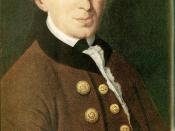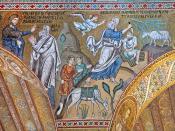G-D wants to test Abraham's faith and tells Abraham to sacrifice his beloved son, Isaac. Isaac at this time is a man, approximately 30 years old. Abraham takes Isaac to prepare for the sacrifice, and when G-D showed the sacrificial location, Abraham took Isaac to the place of G-D. On the journey, Isaac asks his father, "I see the fire and the wood! But where is the lamb for the burnt offering" (7)? Abraham replies, "God himself will provide the lamb for the burnt offering, my son" (8). Isaac is bound and laid across the wood, and as Abraham reveals his knife to kill his son, an angel appears and tells Abraham not to murder. G-D tells Abraham, "I will bless you and I will increase your descendants to the number of the stars in the skies and the number of sand grains on the shore of the sea, and your descendants shall possess the gates of their enemies" (17), but after this event, he lost the respect of his son forever.
A key concept that is shown in this story is the development of duty. Immanuel Kant believes that "our concept of duty implies that we have things we should do even when we don't want to" (9.13). Also, he explains that acting morally is the duty of man and that immoral acts contribute to chaos. Soren Kierkegaard's principles of duty are to be authentic and free. Kierkegaard's believes authenticated behavior is the ultimate goal. Kant's morality arguments control one's actions, while Kierkegaard emphasizes the affect of freedom. Kierkegaard believes that to reach one's duty of aestheticism, one must first obtain the duty to be ethical. Faith is a large part of Kierkegaard's argument of Abraham's admirable character. He is perplexed at how Abraham could `raise the knife'...


